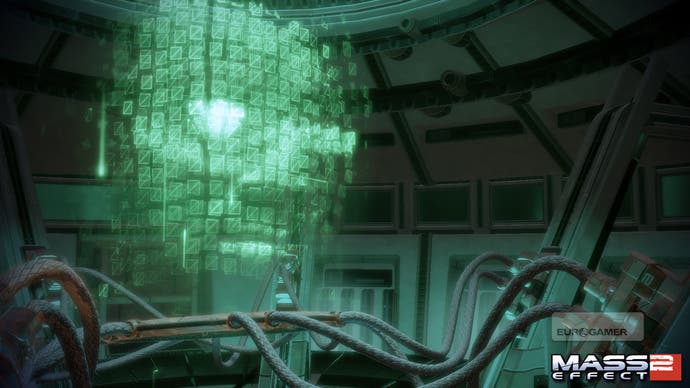Mass Effect 2: Overlord
Good lord.
It looks a bit daft, and never feels like you're really at the helm of a futuristic military vehicle. This distancing effect becomes more pronounced later, when you have to zip about, tricking a giant one-hit-kill Geth cannon into blasting its own shield generators, or hopping from rock to rock up a river of magma, like some sci-fi version of Frogger. These bits are fake and videogamey, and it's hard to connect them to the more robust and immersive action on foot.
Thankfully, these distractions are too brief to detract from the overall experience. Each base has its own unique tempo, as artificially awoken Geth test subjects scuttle back to life. Wisely it's not non-stop blasting from beginning to end. In one of the bases, you'll spend a lot of time walking deeper and deeper into the facility without incident, passing dozens of deactivated and broken Geth along the way, tension coming not from combat but the suspicion that you'll be coming back this way later, when these inert foes will be considerably livelier.
There are even a couple of puzzles - one involving moving walkways to cross a flooded room, the other a mathematically challenged elevator. Neither will leave you scratching your head for long, but that's not really the point. They're there to make your brain change gear, refocusing from assault tactics to logical problem solving, and it's the sort of change in pace that keeps Overlord interesting through its two hours or so of gameplay.

Of course, action isn't really why we crave DLC for games like Mass Effect 2. If we just wanted to blast more enemies, we could just start a new game or reload an old save and replay a favourite mission. No, we look to DLC because we want to spend more time in this universe, to experience new stories alongside characters we enjoy, and it's here that Overlord both soars and stumbles.
Overlord's ending, which I will try not to spoil, is very effective, certainly more so than you'd expect from an optional extra. Thought, care and balance has gone into shaping this interactive novella. Shepherd has faced rogue artificial intelligences before, most memorably in the lunar side quest of the original game, but this is ultimately more than just another tale of man versus dictatorial machine and the ethical choice at the end is between the lesser of two apparent evils, not a cut and dried good or bad coin toss. Even the boss fight that leads up to it bucks expectations, driven by containment rather than destruction.

Where the DLC drops the ball is in the way your characters react to what happens, or rather don't react. At all. Shepherd gets dialogue in a handful of new cut-scenes, but with 12 potential companions to cater for, there clearly wasn't any budget for new voiceover work in-game.
While that may be understandable from a practical development standpoint, it's a noticeable omission as a player. The circumstances of the ending are such that characters like Jack, Mordin and Legion would certainly have something to say, but seeing them standing mute reminds you that they're just digital puppets, not the fleshed-out characters of the main game's storyline.
That's a shame, but along with the Hammerhead combat, it's also one of the only real disappointments in an entertaining side dish that easily justifies its asking price.
Mass Effect 2: Overlord is out now for PC and Xbox 360, where it costs 560 Microsoft Points (£4.76 / €6.72).








